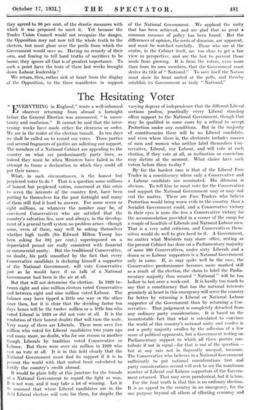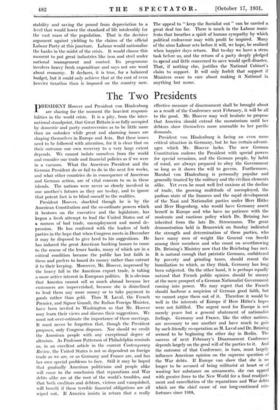The Hesitating Voter
" EVERYTHING in England," wrote a well-informed observer returning from abroad a fortnight before the General Election was announced, " is uncer- tainty and confusion." It cannot be said that the inter- vening weeks have made either for clearness or order. We are in the midst of the Aection tumult. In ten days we shall be called on to record our votes. Three parties and several fragments of parties are soliciting our support. The members of a National Cabinet are appealing to the country on what are predominantly party lines, as indeed they must be when Ministers have failed in the attempt to frame a declaration to which they could all put their names.
What, in such circumstances, is the honest but perplexed voter to do ? That is a question some millions of honest but perplexed voters, concerned at this crisis to serve the interests of the country first, have been putting to themselves for the past fortnight and many of them still find it hard to answer. For some seven or eight millions, or whatever the number may be, of convinced Conservatives who are satisfied that the country's salvation lies, now and always, in the develop- ment of a general tariff system no problem arises—though some, even of these, may well be asking themselves whether high tariffs (Sir Edward Hilton Young has been asking for 88N per cent.) superimposed on a depreciated pound are really consistent with financial or commercial sanity. But the traditional Conservative, no doubt, his path smoothed by the fact that every Conservative candidate is declaring himself a supporter of the National Government, will vote Conservative just as he would have if no talk of a National Government had been in the air at all.
But that will not determine the election. In 1929 be- tween eight and nine million electors voted Conservative and between eight and nine million voted Labour. The balance may have tipped a little one way or the other since then, but it is clear that the deciding factor ten days hence will be the twelve million or a little less who voted Liberal in 1929 or did not vote at all. It is the resolution of their honest doubts that will turn the scale. Very many of them are Liberals. There were over five million who voted fol. Liberal candidates two years ago and many more, no doubt, who for one reason or another though Liberals by tradition voted Conservative or Labour. But there were over six million in 1929 who cast no vote at all. It is in this field clearly that the National Government must find its support if it is to present the world with that united front calculated to fortify the country's credit abroad.
It would be plain folly at this juncture for the friends of a National Government to regard the fight as won. It is not won, and it may take a lot of winning. Let it be assumed that where Liberal candidates are in the field Liberal electors will vote for them, for despite the varying degrees of independence that the different Liberal sections profess, practically every Liberal standing offers support to the National Government, though that may be qualified in some cases by a refusal to accept Protection under any conditions. But in the majority of constituencies there will be no Liberal candidate, and even where there is, the electorate includes masses of men and women who neither label themselves Con- servative, Liberal, nor Labour, and will vote at each election, if they vote at all, as inclination or conviction may dictate at the moment. What choice have such voters' before them to-day By far the hardest case is that of the Liberal Free Trader in a constituency where only a Conservative and a Labour candidate are nominated. His dilemma is obvious. To tell him he must vote for the Conservative and support the National Government may or may not end the matter. There are Free Traders who believe Protection would bring worse evils to the country than a Socialist Government could, and a Conservative victory in their eyes is none the less a Conservative victory for the accommodation provided in a corner of the camp for a couple of handfuls of Liberals and National Labour men. That is a very solid criticism, and Conservatives them- selves would do well to give heed to it. A Government, no matter what Ministers may share office, resting as the present Cabinet has done on a Parliamentary majority of some 260 Conservatives, under sixty Liberals and a dozen or so Labour supporters is a National Government only in name. If, as may quite well be the case, the Conservative predominance becomes more marked still as a result of the election, the claim to label the Parlia- mentary majority thus secured " National " will be too hollow to last over a week-end. It is hardly too much to say that a constituency that has the national interests genuinely at heart in this emergency will serve the country far better by returning a Liberal or National Labour supporter of the Government than by returning a Con- servative. That judgement is completely detached from any ordinary party considerations. It is based on the incontestable fact that what is calculated to convince the world of this country's national unity and resolve is not a party majority swollen by the adhesion of a few score of political opponents, but a Government resting on Parliamentary support to which all three parties con- tribute if not in equal—for that is out of the question— but at any rate not in flagrantly unequal, measure. The Conservative who believes in a National Government sufficiently to put national considerations first and party considerations second will seek to see the maximum number of Liberal and Labour supporters of the Govern- ment returned. That may seem paradoxical, but it is true.
For the final truth is that this is no ordinary election. It is an appeal to the country in an emergency, for the one purpose beyond all others of effecting economy and stability and saving the pound from depreciation to a level that would lower the standard of life intolerably for the vast mass of the population. That is the decisive argument against yielding to the claims of the official Labour Party at this juncture. Labour would nationalize the banks in the midst of the crisis. It would choose this moment to put great industries like iron and steel under national management and control. Its programme involves heavy fresh expenditure and says not one word about economy. It declares, it is true, for a balanced budget, but it could only achieve that at the cost of even heavier taxation than is imposed on the country now. The appeal to " keep the Socialist out " can be carried a great deal too far. There is much in the Labour mani- festo that breathes a spirit of human sympathy by which political endeavour may with profit be inspired. Many of the aims Labour sets before it will, we hope, be realized when happier days return. But to-day we have a stern task before us, and the return of a party deeply pledged' to spend and little concerned to save would spell disaster. That, if nothing else, justifies the National Cabinet's claim to support. It will only forfeit that support if Ministers cease to care about making it National in anything but name.







































 Previous page
Previous page